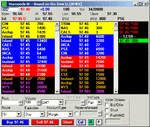JTrader
Guest
- Messages
- 5,741
- Likes
- 507
I feel that if I am ever to take my traidng to the next level, I need to start trading through Direct Access. Etrade Direct Access CFD's offer 0.2%-0.1% commissions. Although this doesn't sound much, 0.1% means that I have to make 0.8 points profit on a trade before I break even and cover my trading fees. 0.15% would mean 1.2 points, and 0.2% would mean 1.6 points profit needed to break even on a trade. This adds a considerable amount of pressure.
I have been in this game for around 1 year and so my knowledge beforehand is fairly limited with regard to trading fees. My theory woud be is that as the broker market place becomes ever more competitive services will continue to improve and commissions and trading terms will also improve. What do others think? Is this what is already happening?
by how much can things improve?
What could the situation be like in two-three years time?
All contributions welcomed,
Cheers.
I have been in this game for around 1 year and so my knowledge beforehand is fairly limited with regard to trading fees. My theory woud be is that as the broker market place becomes ever more competitive services will continue to improve and commissions and trading terms will also improve. What do others think? Is this what is already happening?
by how much can things improve?
What could the situation be like in two-three years time?
All contributions welcomed,
Cheers.
Last edited:

